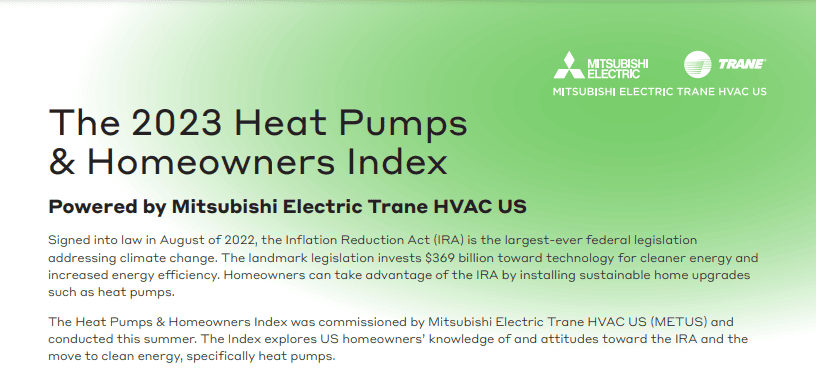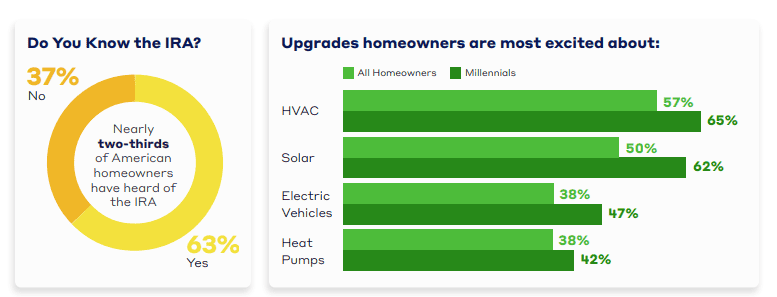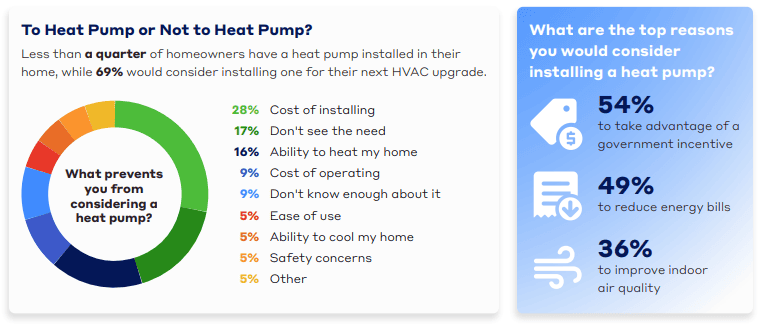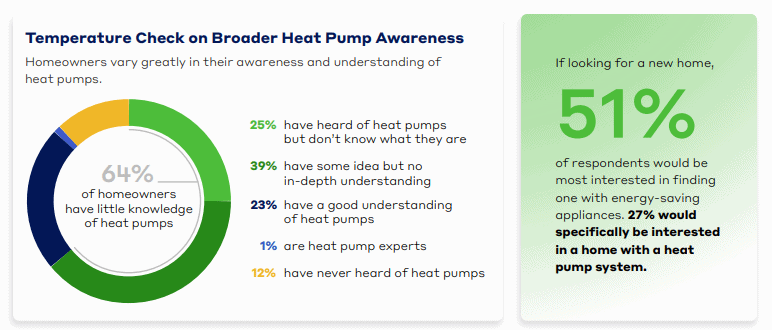Maximizing Home Energy Efficiency with Heat Pumps: Insights from the 2023 Heat Pumps & Homeowners Index
With rising energy costs and a greater focus on sustainability, homeowners are searching for ways to maximize energy efficiency in their homes. One of the most effective solutions is installing a heat pump system for heating and cooling. The recently published 2023 Heat Pumps & Homeowners Index from Mitsubishi Electric Trane HVAC US (METUS) provides valuable insights into homeowner attitudes and motivations when it comes to heat pumps. This article will analyze the key findings from the index and explain how heat pumps can help homeowners save energy and money.
Table of Contents:

Insights from the 2023 Heat Pumps & Homeowners Index
In August 2022, President Biden signed the landmark Inflation Reduction Act (IRA) into law. The IRA includes transformative provisions and incentives to accelerate the transition to cleaner energy across the United States.
Introduction
In August 2022, President Biden signed the landmark Inflation Reduction Act (IRA) into law. The IRA includes transformative provisions and incentives to accelerate the transition to cleaner energy across the United States. For homeowners, this presents an opportunity to make upgrades like installing heat pumps and improve energy efficiency, while benefiting from IRA rebates, tax credits, and savings on utility bills.
Heat pumps are innovative heating and cooling systems that transfer heat between indoor and outdoor environments. As an efficient alternative to furnaces and air conditioners, heat pumps can play a major role in reducing home energy use and carbon footprint. The 2023 Heat Pumps & Homeowners Index compiled by leading HVAC manufacturer METUS provides data-driven insights into homeowner perceptions, motivations, and barriers when considering heat pump adoption.

METUS IRA Fast Facts
Understanding the Inflation Reduction Act and Its Impact on Homeowners
The Inflation Reduction Act is the most ambitious climate legislation ever passed in the US. It earmarks over $370 billion for energy security and climate change programs. Importantly, it extends and expands tax credits for homeowners who invest in energy efficiency upgrades. For heat pump installations, the IRA provides a tax credit covering 30% of the system cost through 2032. This credit applies to both air source and ground source heat pumps. Additional rebates and incentives are offered by utility companies and state/local governments to further reduce upfront costs. Overall, the IRA makes it more affordable for millions of households across America to install heat pumps. With lower annual heating and cooling costs, homeowners can realize long-term utility bill savings.
GET A PERSONALIZE QUOTE FOR YOUR
DUCTLESS MINI SPLIT SYSTEM TODAY!
Mitsubishi award-winning Diamond Contractor
Serving New York and New Jersey

The 2023 Heat Pumps & Homeowners Index: Key Findings

METUS IRA Fast Facts
METUS conducted its second annual nationwide Heat Pumps & Homeowners Index survey in October 2022. It provides data on homeowner awareness of the IRA's benefits, attitudes toward heat pumps and other upgrades, and motivations driving adoption.
Key findings from the 2023 Index include:
- 63% of homeowners are aware of the IRA's rebates and tax credits for energy-efficient upgrades.
- 76% expressed excitement about upgrading HVAC systems, ahead of other improvements like solar panels or electric vehicles.
- 67% of homeowners intend to consider heat pumps the next time their HVAC system needs replacement.
- The top motivations for installing heat pumps are energy bill savings, federal tax credits, and environmental benefits.
- 51% of respondents still face confusion about how heat pumps work and their advantages.
These insights demonstrate high homeowner interest in leveraging the IRA to install heat pumps. But knowledge gaps remain around heat pump benefits and technology.

METUS IRA Fast Facts
Among homeowners surveyed for the Index, 67% said they would consider heat pumps for their next HVAC system upgrade. With over half of US households expected to replace HVAC equipment in the next five years, this indicates significant openness to heat pump adoption. Currently, 15% of homeowners have a heat pump while 31% are seriously considering one for their next replacement HVAC system. The number one reason given for installing a heat pump is expected energy and cost savings. However, 34% of homeowners remain uncertain about significant upfront investment required. Poor understanding of heat pump benefits and distrust about effectiveness, especially in colder climates, remain top barriers to wider adoption. Targeted education on long-term cost savings potential and heat pump technological advances for cold weather are still needed to convince more homeowners.
The Economic and Environmental Motivations Behind Heat Pump Installation
The 2023 Heat Pumps & Homeowners Index reveals how both economic and environmental factors are driving interest in heat pumps. With inflation at a 40-year high, residential energy costs are skyrocketing nationwide. 85% of homeowners paid more for heating and cooling in 2022 compared to 2021. The average reported increase was $418 for the year.
This highlights how heat pumps can benefit homeowners financially. Heat pumps are on average 50% more efficient than HVAC alternatives, delivering savings of 20-45% on annual utility bills.
Environmental motivations are also compelling, especially for younger homeowners. 63% of respondents view heat pumps as an impactful way to reduce their carbon footprint and improve local air quality along with other home upgrades like solar panels and EV charging.
Homeowners' Optimal Room Temperature Preferences and "Thermostat Wars"
An interesting finding from the index is the discrepancy in optimal room temperature preferred by homeowners. The average desired temperature in winter was 70°F (21°C) while summer was 74°F (23°C).
However, there were significant differences across age and gender. Women preferred warmer winter temperatures of 72°F vs 68°F for men. And homeowners above 50 years old had lower desired room temperatures than younger adults. These gaps contribute to common "thermostat wars" within households over heating and cooling settings. With their precise room-by-room temperature control, heat pumps can help resolve these conflicts while maintaining efficiency and comfort.
Mitsubishi Electric Trane HVAC US LLC (METUS): Leading the Way in Heat Pump Technology
Mitsubishi Electric Trane HVAC US LLC (METUS) is one of the leading providers of ductless and ducted mini-split heat pumps in the US residential market. First introduced in the US in 2002, METUS heat pumps now have over 3 million installations nationwide. METUS offers an extensive product selection including single-zone and multi-zone systems, cold climate heat pumps rated down to -13°F (-25°C), and innovative Hyper-Heating INVERTER® (H2i®) technology for rapid heating. Smart controls and connectivity options provide further convenience and efficiency.
With emphasis on research and development, METUS delivers reliable and energy-saving heat pump technology to homeowners across America seeking sustainability upgrades. The company's 2023 Heat Pumps & Homeowners Index provides unique perspectives into consumer attitudes valuable for the industry.
Heat Pump Awareness Among Homeowners
While interest is rising, the 2023 Index found gaping gaps still exist in homeowner knowledge and awareness around heat pump benefits:
- Only 22% of homeowners say they are very familiar with how heat pumps work. 58% admit limited understanding.
- Merely 39% are aware heat pumps can provide air conditioning as well as heating.
- Just 48% recognize modern cold climate heat pump effectiveness down to 5°F (-15°C).
This lack of understanding remains the greatest challenge limiting mass adoption of heat pump technology. Targeted education campaigns and content marketing from HVAC companies are essential to convey advantages over traditional systems. Emphasizing energy efficiency, heating/cooling capabilities, cold weather optimization, and ease of installation helps build homeowner confidence in heat pumps as the premier solution.
GET A PERSONALIZE QUOTE FOR YOUR
DUCTLESS MINI SPLIT SYSTEM TODAY!
Mitsubishi award-winning Diamond Contractor
Serving New York and New Jersey

Conclusion
With the incentives and rebates provided through the IRA, now is the ideal time for homeowners to consider installing heat pumps. As an energy-efficient alternative to old furnaces and AC systems, heat pumps can provide long-term savings on monthly utility bills and help shrink home carbon footprints.
Key data from METUS' 2023 Heat Pumps & Homeowners Index demonstrates strong consumer interest in heat pumps, especially as rising energy costs drive demand for cost-saving upgrades. However, gaps in awareness around precise heat pump benefits and functionality still need to be addressed across America.
As a leader in the industry, METUS offers valuable insights while delivering innovative heating and cooling technology to homeowners nationwide. For sustainable and economical HVAC systems, heat pumps are an upgrade every homeowner should evaluate.
To explore the advantages of heat pumps, including potential tax credits under the Inflation Reduction Act, visit the METUS website and access their comprehensive heat pump buying guide. METUS offers a broad range of ASZ Hyper-Heating and Zuba Central heat pumps, designed to provide efficient heating and cooling solutions for homes. For personalized guidance and to discover the ideal heat pump system for your needs, consider consulting with a METUS dealer near you. They can help you navigate the incentives available, ensuring you make a well-informed decision.
Additionally, for expert installation services, especially if you're considering ductless mini-split systems, Richair Comfort Solutions is your go-to provider. Specializing in ductless mini-split installations, we at Richair Comfort Solutions are committed to enhancing your home's energy efficiency, comfort, and environmental footprint. Trust us to deliver top-notch installation services that leverage the latest in heat pump technology, complemented by the attractive incentives offered through initiatives like the Inflation Reduction Act.
Back Home - Richair Comfort Solution - Ductless Mini Split Systems Top Quality Installations and Professional Service.
Was This Article Helpful?
RECENT POSTS

